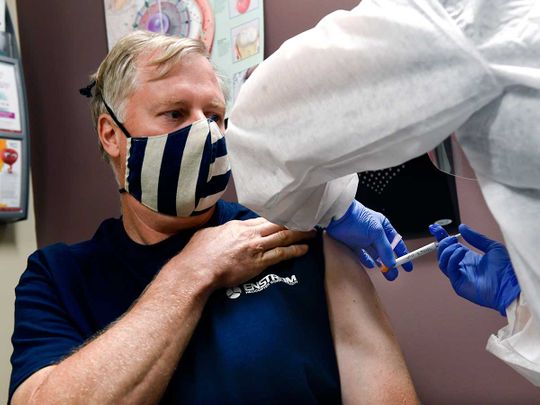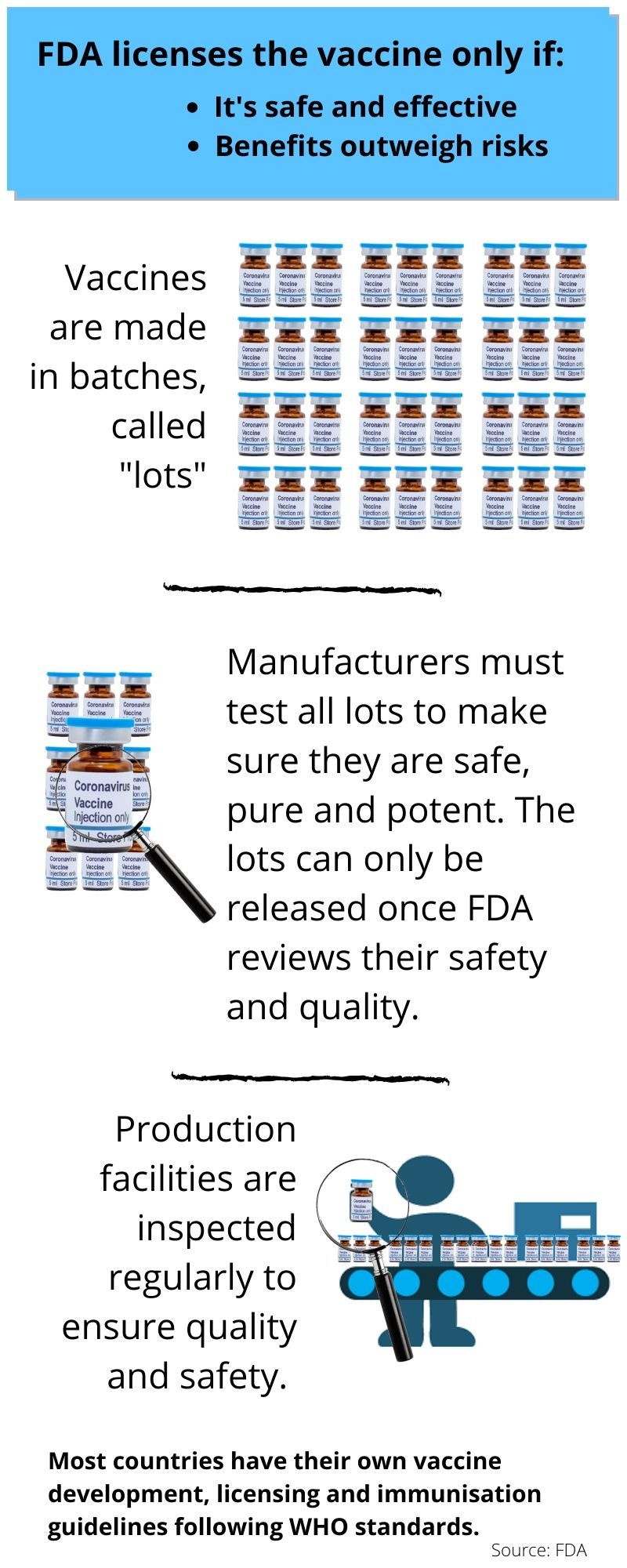
Real-time review of Pfizer-BioNTech COVID-19 vaccine in Canada
Health Canada will start a real-time review of Germany's BioNTech SE and Pfizer Inc's experimental COVID-19 vaccine, the companies said on Friday. The companies said they would submit safety and efficacy data from the trial of their COVID-19 vaccine to Canada's health ministry under a "rolling submission" — as and when it becomes available.
A rolling review allows researchers to submit findings in real time, without waiting for studies to conclude. Canadian health minister Patty Hajdu last month signed an order allowing companies developing COVID-19 vaccines to submit information as it becomes available.
Health Canada said it will not make a decision on whether to authorise any vaccine under rolling review until it has received the necessary evidence to support the candidate's safety, efficacy and quality. The EU health regulator on Tuesday launched a real-time review of the companies' experimental COVID-19 vaccine to potentially speed up the process of approving a vaccine.
Canada's health ministry in its attempts to accelerate a potential approval of a COVID-19 vaccine also started a real-time review of AstraZeneca and Oxford University's vaccine candidate a week ago.
WHO welcomes Moderna's move not to enforce COVID-19 vaccine patents
GENEVA: World Health Organization (WHO) chief Tedros Adhanom Ghebreyesus welcomed on Friday US drug company Moderna Inc's decision not to enforce patents related to its experimental COVID-19 vaccine while the pandemic continues. Moderna announced the move on Thursday, which would allow other drugmakers to develop shots using the company's technology. The firm is one of the furthest along in the U.S. race for a vaccine seen as essential to ending the coronavirus pandemic, which has claimed more than a million lives worldwide.
China says will purchase COVAX vaccines for 1% of population
BEIJING: China will purchase COVID-19 vaccines for 1% of its population, or 15 million people, via a global scheme backed by the World Health Organization, the Foreign Ministry said on Friday. Beijing's move to join the COVAX programme means China "will be procuring vaccines through the facility for a proportion of their own population, just as with other countries", a spokesman for GAVI, which co-leads the scheme, said earlier.
The first batch of vaccine available under the plan will be in short supply, so there would be less for other countries if China had secured doses for a large number of its 1.4 billion people, ministry spokeswoman Hua Chunying told a news briefing. China has at least four experimental vaccines in final stages of clinical trials, and is also in talks with the WHO to have its domestically made vaccines assessed for international use.
Self-financing countries in COVAX scheme can request vaccine doses sufficient for 10-50% of their populations, GAVI said on its website. Funded countries will receive enough doses to vaccinate up to 20% of their population in the longer term, GAVI said.
Russia expected to register second COVID-19 vaccine on Oct. 15 -developer
MOSCOW: Russia is expected to register a second potential vaccine against COVID-19 on Oct. 15, the vaccine's developer said on Friday. The vaccine has been developed by Siberia's Vector Institute, which completed early-stage human trials of the vaccine last month.
Trump official says vaccine expected starting in January
A Trump administration official leading the response to the coronavirus pandemic says the U.S. can expect delivery of a vaccine starting in January 2021, despite statements from the president that inoculations could begin this month. And a growing, bipartisan chorus of lawmakers, experts and public health officials says the country is ill prepared for a projected winter surge of COVID-19. Dr. Robert Kadlec said in an email Friday that the administration "is accelerating production of safe and effective vaccines ... to ensure delivery starting January 2021."
Kadlec is the Department of Health and Human Services' assistant secretary of preparedness and response. HHS says a vaccine could be approved before the end of the year but will take time to distribute. President Donald Trump has said at rallies, debates and press conferences that a vaccine could arrive within weeks. "We think we can start sometime in October," Trump said at a White House press briefing last month. Kadlec wasn't the first health official to counter the president's optimistic timeline.
Health and Human Services Secretary Alex Azar said Thursday that there could be 100 million vaccine doses available by the end of the year "pending FDA authorizations". And Dr. Moncef Slaoui, who is leading the government's vaccine effort, told Marketwatch on Friday that researchers could know "by late October, or November, or in December" whether one of the vaccines in development is effective, but that it would then take "weeks" to get emergency authorization to administer it.
FDA publishes vaccine guidelines opposed by White House
The Food and Drug Administration has released its updated safety standards for developers of COVID-19 vaccines after the White House previously blocked their formal release
WASHINGTON: The Food and Drug Administration released updated safety standards Tuesday for makers of COVID-19 vaccines despite efforts by the White House to block them, clearing the way for requirements that are widely expected to prevent the introduction of a vaccine before Election Day.
President Donald Trump has repeatedly insisted a vaccine could be authorised before November 3, even though top government scientists working on the effort have said that timeline is very unlikely. On Monday Trump said vaccines are coming "momentarily", in a video recorded after he returned to the White House.
Former FDA officials have warned that public perception that a vaccine was being rushed out for political reasons could derail efforts to vaccinate millions of Americans. A senior administration official confirmed Monday that the White House had blocked FDA's plans to formally publish the safety guidelines based on the two-month data requirement, arguing there was "no clinical or medical reason" for it.
But on Tuesday, the FDA posted the guidance on its website, making clear that regulators plan to impose the safety standards for any vaccine seeking an expedited path to market. FDA Commissioner Stephen Hahn said in a statement that he hoped the guidelines would help "the public understand our science-based decision-making process that assures vaccine quality, safety and efficacy".
The requirements are aimed at companies seeking rapid approval through the FDA's emergency authorization pathway. That accelerated process, reserved for health emergencies, allows medical products onto the market based on a lower bar than traditional FDA approval. But FDA has made clear only vaccines that are shown to be safe and effective will be authorized for coronavirus.
Former FDA acting commissioner Dr. Stephen Ostroff said the requirements seem reasonable given the agency is in largely "uncharted territory" in terms of considering emergency use of a vaccine. The agency has only previously cleared one vaccine through the method — a decades-old shot that was authorised to prevent anthrax poisoning in 2005. "There really is no margin for error here," Ostroff said. "Even when you're talking about limited use of a vaccine there has to be some level of assurance that there isn't a risk here that would far outweigh the benefit."
Dr. Peter Marks, the head of FDA's vaccine division, said Tuesday that the two-month follow-up requirement was chosen to be "something reasonably aggressive, but not too conservative — right in the middle." He spoke at a symposium organized by Johns Hopkins University. Initial doses of vaccines for emergency use would likely be reserved for medical workers and people with health conditions that make them particularly vulnerable to coronavirus. Full FDA approval for the general population will require significantly more data and is not expected until mid-2021.
The White House attempt to block the guidance followed a string of instances in which the Trump administration has undercut its own medical experts working to combat the pandemic. FDA's Hahn has been attempting to shore up public confidence in the vaccine review process for weeks, vowing that career scientists, not politicians, will decide if the shots are safe and effective.
Vaccine manufacturing

Pfizer CEO Albert Bourla has stoked excitement by saying that he expects data on whether the company's candidate works to be ready in late October. But a number of variables would still have to align for the company to submit, and the FDA to review and greenlight, a vaccine application before Nov. 3. Pfizer's competitors Moderna, AstraZeneca and Johnson & Johnson are working on longer research timelines.
Vaccine development typically takes years, but the U.S. government has invested billions in efforts to accelerate the process and help multiple drugmakers prepare multiple candidates. All the doses will be purchased by the federal government for use vaccinating the U.S. population.
Beyond exposing the rift between the White House and FDA, the delay in releasing the guidelines may have had limited practical effect. FDA scientists have been discussing the guidelines publicly for weeks and have made clear that the recommendations have already been shared with each of the vaccine developers.
Former FDA Commissioner Scott Gottlieb said Tuesday that drugmakers depend on the FDA's science-based endorsement to vouch for the safety and effectiveness of their products.
"I can't imagine a circumstance where a sponsor would challenge or seek to undermine the FDA's role here,'' Gottlieb said at the COVID-19 symposium. "This is precisely the moment when we need an objective, neutral arbiter." Last week, Gottlieb and six other former FDA commissioners blasted the Trump administration for "undermining the credibility" of the agency in a op-ed calling for the release of the then-stalled vaccine guidelines. "Scientists should make decisions based on data, unfettered by political pressure or the intrusions of ideology or vested interests," the officials wrote.








